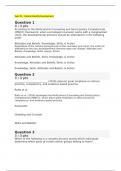Quiz #1 : Cultural Identity Development
Question 1
pts
According to the Multicultural Counseling and Social Justice Competencies
(MSJCC) framework, when a privileged counselor works with a marginalized
client, the developmental domains should be attended to in the following
order:
Attitudes and Beliefs, Knowledge, Skills, & Action
Regardless of the cultural backgrounds of the counselor and client, the order for
attending to the four developmental domains does not change: Attitudes and
Beliefs, Knowledge, Skills, & Action.
Attitudes and Beliefs, Skills, Knowledge, & Action
Knowledge, Attitudes and Beliefs, Skills, & Action
Knowledge, Skills, Attitudes and Beliefs, & Action
Question 2
pts
___________________________ (2016) place(s) great emphasis on ethical
practice, competency, and evidence-based practice.
Ratts et al.
Ratts et al. (2016) developed the Multicultural Counseling and Social Justice
Competencies (MSJCC), which place great emphasis on ethical practice,
competency, and evidence-based practice.
Ponterotto
Gladding and Crockett
Willis and Neblett
Question 3
pts
Which of the following is a complex process during which individuals
determine which parts of certain ethnic groups belong to them?
,Racial identity development
Ethnicity
Orthogonal cultural identity
Ethnic identity development
Ethnic identity development is a term used to describe the process by which an
individual determines his or her own unique ethnic identity.
Question 4
pts
The inclusion of diverse perspectives and context in the counseling process
is known as:
interpersonal counseling.
culturally responsive counseling.
Culturally responsive counseling includes diverse perspectives of others in the
counseling relationship. Culturally responsive counseling allows each unique client
to be viewed and understood within his or her individual context.
theoretical liberation.
problem solving.
Question 5
pts
Culturally diverse individuals might have a mistrust of the counseling
profession as a result of which of the following?
Historical undertones of racism and other forms of oppression in the mental
health fields
Although the profession's ethical codes prohibit discrimination, certain populations
have been oppressed by counselors (whether intentionally or unintentionally).
Insurance companies' preferences for medical interventions
The ineffectiveness of counseling interventions
,The recent push to promote and normalize counseling in Western culture
Question 6
pts
In 2017, the estimated percentage of U.S. adults who reported any type of
mental illness (i.e., mental, behavioral, or emotional disorder) for the
previous year was:
15.2%
18.9%
18.9% (46.6 million) of U.S. adults reported any type of mental illness (i.e., mental,
behavioral, or emotional disorder) for the previous year.
20.4%
25.8%
IncorrectQuestion 7
pts
Symbiosis is the first stage of which of the following Spiritual Identity
Models?
Spero's Development of Religious Transformations Model
Fowler's Model of Faith Development
Genia's Development of Growth Model
Stage 1 of Genia's Development of Growth Model is called Egocentric Faith.
Poll and Smith's Model of Spiritual Identity
Question 8
pts
Identity Tolerance comprises Stage 3 of which of the following models?
Cass
Identity Tolerance comprises Stage 3 of The Cass Model.
Coleman
, McCarn & Fassinger
Troiden
Question 9
pts
Which of the following terms is used to refer to individuals who move from
place to place for economic reasons?
Refugee
Asylum seeker
Foreign national
Migrant
Migrants are those who move from place to place, usually for economic reasons
such as seasonal work.
Question 10
pts
Which of the following correctly lists the three forces in counseling?
Reason, logic, and emotions
Psychodynamic, interpersonal, intrapersonal
Emotional, cognitive, and behavioral
Psychodynamic, behaviorism, existentialism/humanism
Psychodynamic, cognitive-behavioral, and humanistic-existential conceptualization
and intervention models are supported as the three forces of counseling.
Question 11
pts




